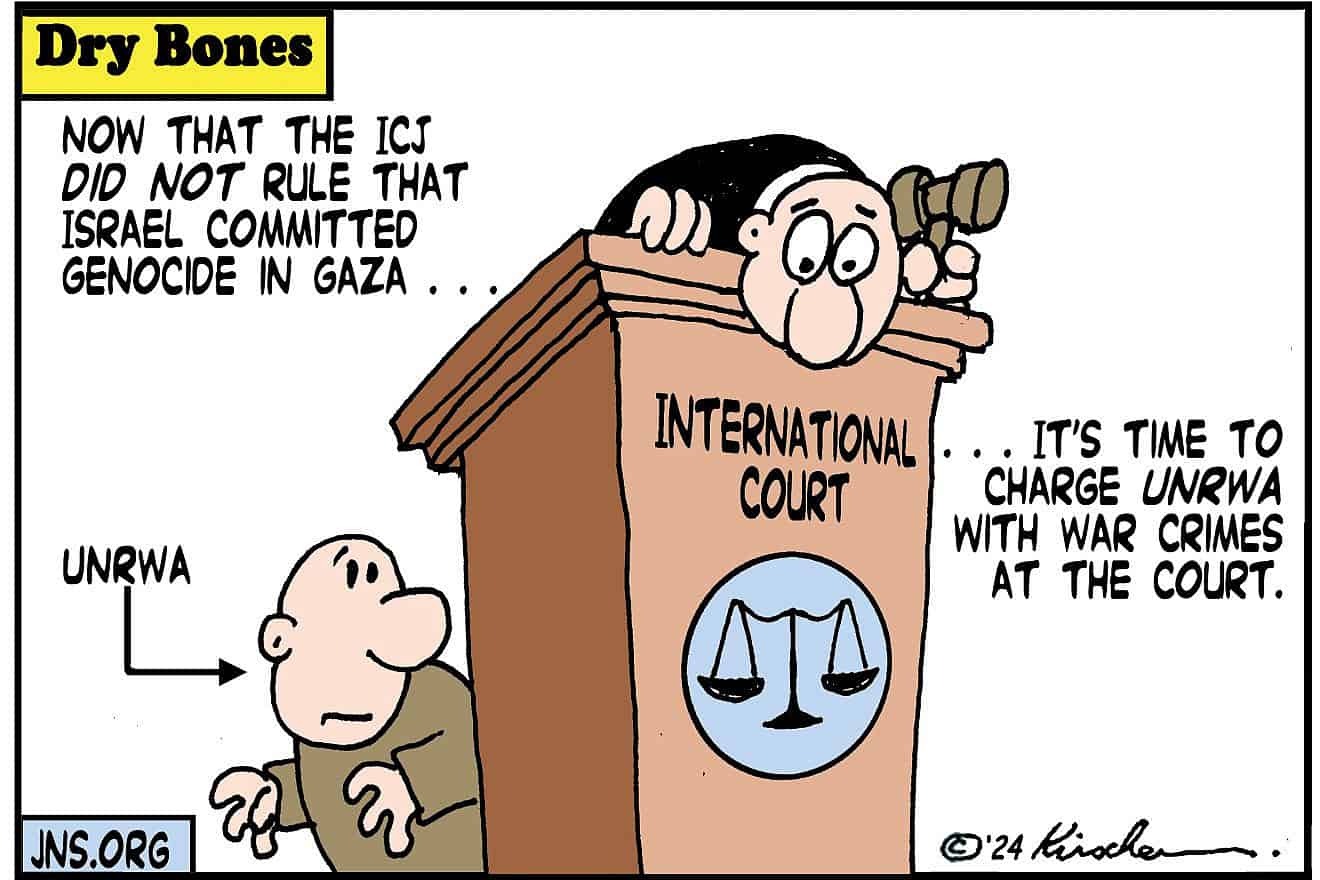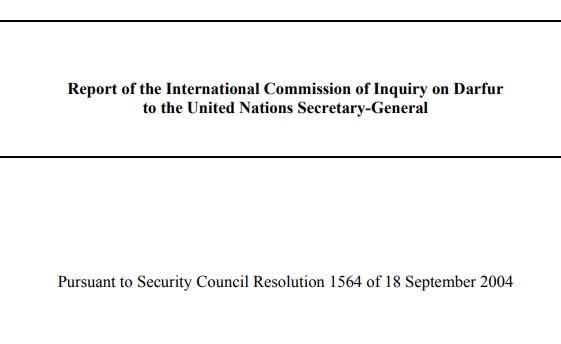Eugene Kontorovich: Israel can limit the ICJ’s potential damage
Israelis on Friday displayed what is called Jewish joy—they celebrated that the pogromniks only broke the windows, but did not kill anyone. The good news was the International Court of Justice did not effectively order us to wait to be tortured and murdered, by demanding a halt to the Gaza War. That is certainly good—but only in the twisted world where the ICJ is putting Israel, not Hamas, on trial for the absolutely absurd charge of genocide.WSJ Editorial: The U.N.’s War on Israel
Otherwise, the decision was horrible. The court accepted South Africa’s argument that it has jurisdiction and that Israel could possibly be proven to be committing genocide. The case is not over and will go on for years. In the meantime, the court has made clear that it considers itself to have authority to review and superintend every aspect of Israel’s war for survival—and demands monthly reports. No other country receives such treatment, and it is designed to make the military constantly look over its soldiers’ shoulders.
The ICJ is not an independent body—it is an organ of the United Nations. Its justices serve a renewable nine-year term, further undermining their independence. The judges are elected by the General Assembly and Security Council, and their positions largely track the foreign policy of their home countries. Thus while we might get lucky sometimes, over the long run, the policy of the court will reflect the policy of the United Nations.
The General Assembly’s obsessive condemnation of the Jewish state is well known—Israel would never agree to have its fate determined by them. But agreeing to the jurisdiction of the court indirectly does the same thing. In Israel it is thought unacceptable to have judges appointed by democratically elected politicians decide the meaning of ordinary laws. Yet we have agreed to have judges elected by dictatorial regimes decide the basic question of whether we can exist—whether we can defend ourselves.
It does not have to be this way: The ICJ does not automatically have jurisdiction over countries—they must specifically agree, typically by agreeing that The Hague can decide a specific dispute or questions under a specific treaty. In this case, Israel signed the Genocide Convention, which provides that “disputes between the…parties” about the treaty can be decided by the ICJ. But that does not mean cases like this, where a totally unrelated state has brought a purely political complaint in a matter it has no relation to. The court should not have accepted jurisdiction, and by doing so it effectively claimed for itself power to supervise the conduct of wars around the world, so long as some country claims genocide is involved.
Israel did not have to agree to the ICJ jurisdiction to be a member of the Genocide Convention, and in retrospect, doing so was a major mistake. Countries are allowed to opt out of ICJ jurisdiction in various treaties, and very commonly do so. Indeed, 16 countries have opted out of the Genocide Convention minus the ICJ jurisdiction—including the world’s largest democracies, the United States and India. Even the world’s biggest superpowers did not trust the ICJ to hear cases involving the use of force in an apolitical way.
What a day for the United Nations. Its International Court of Justice (ICJ) issued a preliminary ruling Friday in South Africa’s case against Israel that managed to be both outrageous and meaningless. At the same time, its special forever-refugee agency for the Palestinians, Unrwa, had to fire staff accused of involvement in Hamas’s Oct. 7 massacre. Our global moral beacon in action.Caroline Glick: Israel’s isolated generals
The ICJ tribunal indulged South Africa’s genocide libel by going ahead with a trial and trashing Israel for self-defense against Hamas. But the justices rejected Pretoria’s request to order Israel to stop the war. The court instead instructed Israel to prevent acts of genocide, punish incitement and facilitate aid to civilians—which Jerusalem is already doing. Israel will have to report back in a month, and the court could take years to decide on the merits.
As law professor Eugene Kontorovich writes, “That’s Jewish joy—they defamed us, treated us like no other democracy, undermined our right to self-defense, put the victim on trial—but it could have been worse!” All true, and an order to halt the war while Hamas holds territory and 136 hostages would have put Israel in a tight spot.
The U.N.’s credibility is also on trial, especially through Unrwa, whose reports the court relied on. After Israel brought evidence that 12 Unrwa employees participated in the Oct. 7 attack, the U.S. State Department announced on Friday a pause in funding to the U.N.’s Palestinian refugee agency pending investigation.
A new U.N. Watch report, to be released and discussed in Congress on Tuesday, shows “how a Telegram group of 3,000 UNRWA teachers in Gaza celebrated the October 7th Hamas massacre.” The message group’s administrators, identified by name and Unrwa contract number, are seen praising Hamas’s “holy warriors” and praying for them to murder Israelis: “O God, tear them apart,” “kill them one by one,” “leave none of them behind,” “execute the first settler on live broadcast.” One urged that Gazans stay in place to help Hamas.
Notably, all of the General Staff’s paradigms are shared by the U.S. foreign-policy establishment. So it isn’t surprising that a consistent position of the generals is that the United States, rather than the IDF, is the guarantor of Israel’s survival. Accordingly, the generals oppose actions that would limit or even end Israel’s strategic dependence on America. That dependence commits the United States to protect Israel, and that protection will be guaranteed if Israel maintains faith in its appeasement policies towards Israel’s enemies.
The public—and rank-and-file officers and soldiers on the ground in Gaza, along the border with Lebanon, and in Judea and Samaria—are unmoved by the generals’ demoralizing messages. They understand that Israel has no option other than to fight the war until victory, whatever the price. The notion of appeasement-based deterrence died on Oct. 7. In successive opinion polls since then, the Israeli public has made clear that it opposes cutting a deal for the hostages that will enable Hamas to survive the war. They oppose Palestinian statehood, and under no circumstances is the public willing to countenance a P.A. takeover of the Gaza Strip the day after the war.
The public’s unwillingness to accept anything less than victory has placed the General Staff in a bind. Reservists being sent home from the front have reacted not with happiness but with indignation at leaving before victory has been achieved. On Feb. 8, angry reservists are planning to hold a mass demonstration demanding to be permitted to fight to victory down the street from the Prime Minister’s Office.
On Wednesday and Thursday, hundreds of relatives of hostages, mothers of IDF soldiers and other concerned citizens blocked humanitarian aid trucks from entering Gaza through the Kerem Shalom border crossing. These citizens recognize that humanitarian aid is just a euphemism for resupply to Hamas. The government, they say, may need to agree to humanitarian aid to placate the Biden administration, but private citizens are under no such constraints. And given the dire implications of the aid for the war effort, standing idly by while Washington compels Jerusalem to give Hamas a lifeline to remain in the tunnels is nothing short of insane.
The public’s operations are not limited to the domestic realm. A new group, Mothers of IDF Soldiers, sent a letter to President Joe Biden on Thursday demanding an end to humanitarian aid to Gaza, arguing that the truckloads of fuel, food, water and medicine endanger the lives of IDF soldiers; is not being distributed to Palestinian civilians; enables Hamas to remain in charge of governing affairs in Gaza; and prolongs the war by giving Hamas terrorists the means to keep fighting from their tunnels and refusing to release the hostages.
Netanyahu, for his part, is not relenting. Nearly every day, he reiterates the war goals and insists that Israel will fight until it achieves all of them. He is demanding that the IDF provide him with benchmarks to measure its progress towards victory.
The generals in charge owe their positions to their full adherence to the strategic paradigms of the United States and the political left. They don’t want to move on. But the unanimity of opinion from the public below and the government above will leave them little choice. They will either get on board and deliver the required victory, or they will eventually be forced to resign and make room for others capable of doing the job.







































